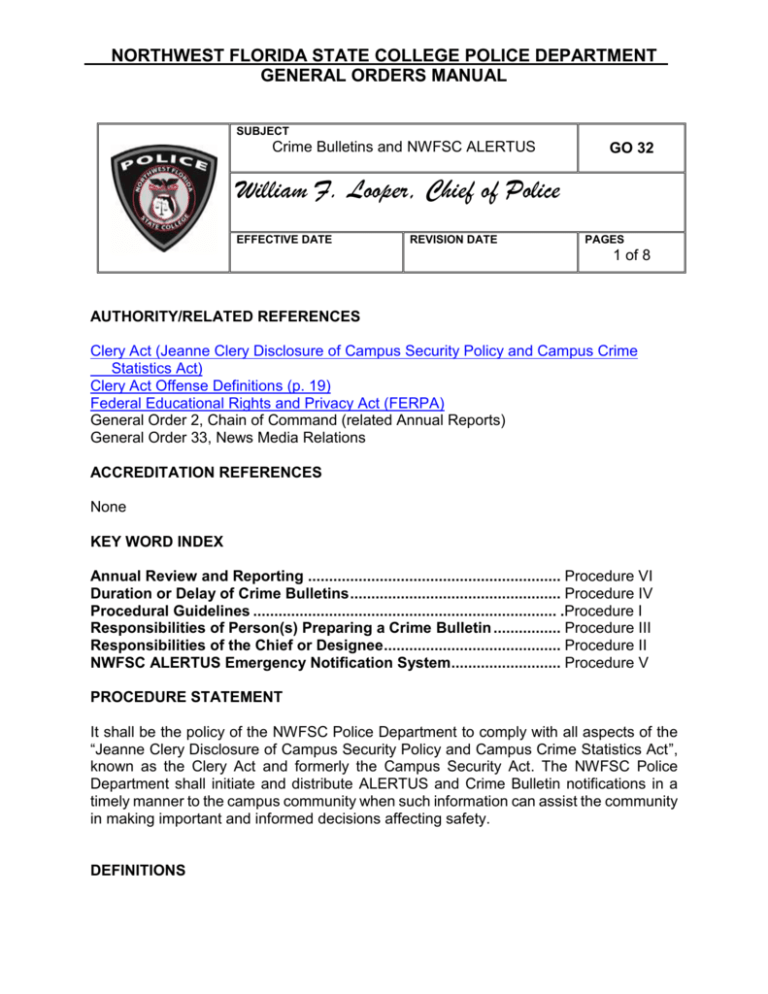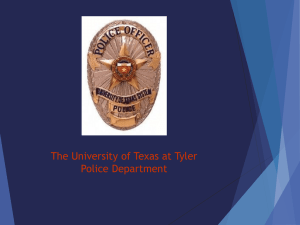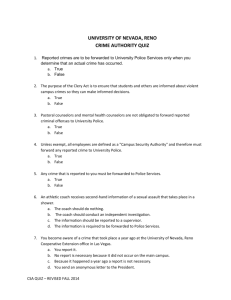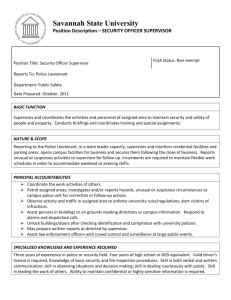GO 32 Crime Bulletins and Clery Alerts
advertisement

NORTHWEST FLORIDA STATE COLLEGE POLICE DEPARTMENT GENERAL ORDERS MANUAL SUBJECT Crime Bulletins and NWFSC ALERTUS GO 32 William F. Looper, Chief of Police EFFECTIVE DATE REVISION DATE PAGES 1 of 8 AUTHORITY/RELATED REFERENCES Clery Act (Jeanne Clery Disclosure of Campus Security Policy and Campus Crime Statistics Act) Clery Act Offense Definitions (p. 19) Federal Educational Rights and Privacy Act (FERPA) General Order 2, Chain of Command (related Annual Reports) General Order 33, News Media Relations ACCREDITATION REFERENCES None KEY WORD INDEX Annual Review and Reporting ............................................................ Procedure VI Duration or Delay of Crime Bulletins .................................................. Procedure IV Procedural Guidelines ........................................................................ .Procedure I Responsibilities of Person(s) Preparing a Crime Bulletin ................ Procedure III Responsibilities of the Chief or Designee .......................................... Procedure II NWFSC ALERTUS Emergency Notification System .......................... Procedure V PROCEDURE STATEMENT It shall be the policy of the NWFSC Police Department to comply with all aspects of the “Jeanne Clery Disclosure of Campus Security Policy and Campus Crime Statistics Act”, known as the Clery Act and formerly the Campus Security Act. The NWFSC Police Department shall initiate and distribute ALERTUS and Crime Bulletin notifications in a timely manner to the campus community when such information can assist the community in making important and informed decisions affecting safety. DEFINITIONS NORTHWEST FLORIDA STATE COLLEGE POLICE DEPARTMENT Campus Security Authority (CSA): Any College employee having significant responsibility for student and campus activities. This includes, but is not limited to, NWFSC police department members, college administrators, athletic coaches, advisors to student groups, Disability Support Services employees, etc. The primary responsibility of a CSA is to encourage crime victims and/or witnesses to report crimes to the police. Clery Act: A federal law requiring institutions of higher education to disclose campus security information including crime statistics for the campus and surrounding areas. Crime Bulletin: An informational announcement, either in hard-copy or electronic format, alerting the College community to an on-going criminal threat as delineated by the Clery Act. Emergency Notification: Under the Clery Act, each institution is required to notify the campus community immediately upon confirmation of a significant emergency or dangerous situation involving an immediate threat to the health or safety of students or employees occurring on the campus. Notifications, which may be customized to a specific segment of the at-risk population, are to be issued without delay upon confirmation of the emergency by responsible authorities previously identified by the college. (Emergencies where issuing a notification would compromise efforts to assist a victim or respond, contain, or mitigate the emergency, are not subject to this notification requirement). NWFSC ALERT: College officials alert the campus community whenever there is a condition that threatens the health and safety of persons on campus, by using multiple electronic warning delivery methods via this Emergency Notification System. Timely Warning: Must be issued in a manner likely to reach the entire campus community in a manner that is timely and will aid in the prevention of similar crimes. It is triggered when the college determines that a crime for which it must report Clery statistics presents a serious or continuing threat to students and employees. The intent of a warning is to enable people to protect themselves, so the warning should be issued as soon as pertinent information is available, even if all the facts surrounding the incident are not available. Follow up messages with additional pertinent information that would promote safety and aid in the prevention of similar crimes should be issued as it is obtained. Crimes that would otherwise be reportable but are reported to a licensed mental health counselor or pastoral counselor – in the context of a privileged (confidential) communication – are not subject to a timely warning requirement. (Note: Under FERPA, an educational institution may disclose information from educational records to any person whose knowledge of the information is necessary to protect the health or safety of the student or other individual in the event of an articulable and significant threat to health and safety). PROCEDURES I. PROCEDURAL GUIDELINES GENERAL ORDER 32-2 NORTHWEST FLORIDA STATE COLLEGE POLICE DEPARTMENT A. When a threatening or dangerous situation is reported to the Department, the Chief of Police or his designee will coordinate a timely review of the circumstances surrounding the situation to determine if the incident represents a continuing threat to the safety of students and employees that would merit an emergency notification or timely warning. 1. Emergency Notifications are triggered by incidents that represent a continuing dangerous or life threatening situation. These situations include, but are not limited to: a. Significant weather events such as tornados, flooding or large hail and natural disasters such as hurricanes; b. Safety hazards such as fire, gas leaks, chemical spills, explosions or the outbreak of a serious illness; and c. Crimes such as: (1) Murder; (2) Sex Offenses; (3) Kidnapping; (4) Robbery; (5) Aggravated Assault; (6) Arson; (7) Any offense involving use of a deadly weapon; (8) Bomb Threats; and (9) Civil unrest or rioting. 2. Timely Warnings are triggered when the institution determines that a crime for which it must report Clery statistics has occurred and the crime presents a serious or continuing threat to students and employees. These crimes may include: a. Criminal Homicide (murder, non-negligent manslaughter, negligent manslaughter); GENERAL ORDER 32-3 NORTHWEST FLORIDA STATE COLLEGE POLICE DEPARTMENT b. Sex offense (forcible or non-forcible); c. Aggravated assault; d. Burglary; e. Motor vehicle theft; f. Arson; g. Hate crimes involving any of the above or theft, simple assault, intimidation or destruction/damage/vandalism of property; h. Possession of weapons; and i. Drug abuse and liquor law violations. 3. At the discretion of the Chief or designee, notifications regarding the above crimes or any other incident requiring similar attention may be made by using any of the following methods, depending upon what is most appropriate for current circumstances, campus safety and compliance with Clery Act requirements: a. The NWFSC website (specifically, a NWFSC ALERT, Crime Bulletin or Police Log page); b. Press release(s) distributed to local media organizations; c. Public safety warning message(s) disseminated to the campus via mass email and/or text message, and/or messaging on social media sites; d. Messages broadcast to the public via the campus loudspeaker system; e. Campus warning sirens; f. Departmental and campus email; g. Intelligence bulletins distributed to law enforcement personnel; and h. Warnings posted adjacent to the entrances to campus buildings. B. Refer to the ‘Clery Act Offense Definitions’ referenced herein on page one, as they may differ from the definitions and elements found in Florida Statutes, the Uniform Crime Report or National Incident Based Reporting System. GENERAL ORDER 32-4 NORTHWEST FLORIDA STATE COLLEGE POLICE DEPARTMENT II. RESPONSIBILITIES OF THE CHIEF OR DESIGNEE A. The Chief of Police or designee shall be responsible for reading and analyzing all police and incident reports of the preceding 24-hour period and draft, approve and disseminate safety warnings and notifications as required. 1. During weekends and state or federal holidays where command staff are normally not on duty, it shall be incumbent upon the Public Safety Communications Officer on duty, or other member assigned dispatching duties in the Communications Center, to immediately notify the on-call supervisor of any crime that has occurred or is occurring on campus which could affect the safety and security of the campus population (i.e., when an incident presents a significant danger to campus security and individual safety). 2. When the reported crime or incident presents a significant danger to campus security and individual safety, the Chief of Police or designee will prepare and disseminate a Crime Bulletin. 3. Whenever appropriate, the Chief of Police or designee will ensure the NWFSC Communications and Public Information Office will be advised of an impending Crime Bulletin distribution. 4. In extreme (dangerous or life-threatening) emergency situations, the NWFSC ALERT Emergency Notification System may be activated if a threat to campus safety is so imminent or immediate that information distribution is necessary for recipients to take immediate protective action. 5. The Chief of Police or designee shall not be bound to consult with other departments or seek approval from outside entities, if doing so would cause a delay that could put members of the community at risk. 6. The Chief of Police or designee will directly and personally notify the NWFSC President or Vice President for Administrative Services of the evolving emergency. Additionally, the Chief of Police or designee have the authority to make decisions regarding the college’s response to the emergency. The President or Vice President may upgrade the response but may not downgrade the response. Decisions must always err on the side of caution and ensuring the safety of students and staff. III. RESPONSIBILITIES OF PERSON(S) PREPARING A CRIME BULLETIN A. The Chief of Police or his designee shall prepare Crime Bulletins consisting of the following: GENERAL ORDER 32-5 NORTHWEST FLORIDA STATE COLLEGE POLICE DEPARTMENT 1. The nature of the criminal offense or significant incident; 2. The date, time, and location of the offense or incident; 3. The description of the suspect(s); 4. Safety tips; and 5. Request that information be provided to other criminal justice agencies. B. The time expended to prepare and disseminate emergency messages shall be as brief as possible to ensure no time is lost. C. The Chief of Police or designee shall prepare and disseminate the Crime Bulletin via appropriate NWFSC ALERT Emergency Notification System capabilities to reach the target audience. D. Nothing in this General Order shall be construed to prohibit the Chief of Police or designee from preparing and distributing a Crime Bulletin when such bulletin refers to a crime or incident not specified as mandatory for distribution under the Clery Act. IV. DURATION OR DELAY OF CRIME BULLETINS A. Crime Bulletins shall be maintained on the Northwest Florida State College website until irrelevant or the associated danger subsides. B. Crime Bulletins may be updated as new information becomes available to further inform the community (e.g., sketch of the subject, additional suspect information). C. Hard Copies of “Confidential” Crime Bulletins may be distributed to members and other Law Enforcement agencies. D. Upon arrest of a suspect(s), when the danger has subsided, or when a need to update the bulletin exists, the Chief of Police or designee may authorize the updating and/or removal of Crime Bulletins on the NWFSC web page. E. In the event the release of a Crime Bulletin is determined to increase the danger to the community, or if it would compromise the successful investigation of a crime, the distribution of a Crime Bulletin may be delayed upon approval of the Chief of Police or designee. GENERAL ORDER 32-6 NORTHWEST FLORIDA STATE COLLEGE POLICE DEPARTMENT a. In cases where a Crime Bulletin is being considered, the first consideration shall be to distribute the bulletin (even if some information is necessarily withheld) in order to inform the campus community. V. NWFSC ALERTUS EMERGENCY NOTIFICATION SYSTEM A. The College maintains an emergency notification system called the NWFSC ALERTUS Emergency Notification System. The system is intended to provide information on an emergency basis for events that are of a criminal or noncriminal nature and which represent an imminent, immediate, and/or on-going life safety threat to the campus community. NWFSC ALERTUS notifications often include instructions for immediate protective actions on the part of recipients. 1. Coordination with the NWFSC ALERTUS system is the primary responsibility of the NWFSC Emergency Management office under the auspices of the NWFSC Police Department, an authorized user with designated members trained in its use. 2. Use of the system is delineated by the NWFSC ALERTUS system and its protocol as developed by the College. 3. System notification distribution shall take precedence over Crime Bulletin distribution under the assumption that a NWFSC ALERTUS and associated protocols are engaged during an immediate and imminent life safety emergency to the NWFSC campus population. 4. In the event the NWFSC ALERTUS system is activated for a criminal act occurring on the campus, and disseminated information includes the information required by the Clery Act, the requirements of this General Order shall be considered to be fulfilled. a. Relevant copies of ALERTUS activation documentation will be included in the records maintained by the NWFSC Emergency Management and Safety office. 5. In the event a NWFSC ALERTUS notification does not meet the information requirements as dictated by the Clery Act, a follow-up Crime Bulletin per this General Order may be issued if it is determined that a threat to the campus or NWFSC community still exists. VI. ANNUAL REVIEW AND REPORTING GENERAL ORDER 32-7 NORTHWEST FLORIDA STATE COLLEGE POLICE DEPARTMENT A. The requirements of Clery Act reporting shall be reviewed and fulfilled each year by completing a NWFSC Annual Security Report, compiled by the Chief of Police or designee. GENERAL ORDER 32-8







